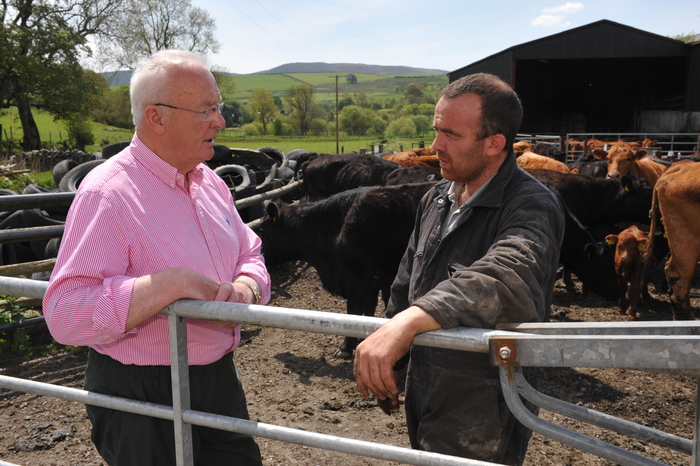Gwaredu BVD, the national programme to eradicate BVD from the Welsh national herd is well ahead of target and, just one year in, over 50% of farms in Wales have been screened – but now the campaign is being ramped up to get widespread adoption.
Bovine Viral Diarrhoea (BVD) is a viral disease in cattle that causes immunosuppression and reproductive failure. The disease can reduce fertility, increase incidences of abortion and cause pneumonia in affected stock, creating drastic, long-lasting personal and financial effects on all affected farms.
The welfare and financial consequences are significant, with an approximate cost of £4,500 per year for the average beef herd, and £15,000 for dairy herds as a result of poor fertility, reduced milk yields, low daily live weight gains, fever, diarrhoea and respiratory problems. Screening is free, and the programme also provides up to £500 for livestock farmers to work with their vet, but this funding will run out in 2020 when testing is likely to be compulsory, so a new campaign is being launched to reach all farmers in the country and get them to act now to stop the disease spreading.
Welsh Government Cabinet Secretary for Energy, Planning and Rural Affairs, Lesley Griffiths AM complimented the programme in her visit to the Gwaredu (Welsh for ‘Eradicate’) BVD stand at this year’s Royal Welsh Show in July, using social media to praise work so far: “Impressed they’ve screened 50% of farms in Wales for Bovine Viral Diarrhoea – a big milestone considering I only launched the programme less than a year ago.”
The Gwaredu BVD £10 million three year voluntary screening programme is available to all 12,000 Welsh cattle farms, and is managed by Coleg Sir Gâr’s Agriculture Research Centre in partnership with the Royal Veterinary College. It involves BVD screening at the same time as TB testing to provide the necessary support and guidance to ensure farmers can correctly and quickly identify herds infected with BVD. Support will also be available to find the persistently infected (PI) animals from infected herds.
John Griffiths, manager of the Agriculture Research Centre at Coleg Sir Gâr’s Gelli Aur campus said: “We are hugely encouraged by the take-up of the screening programme so far from Welsh farmers, but we are under no illusions that the next two years will be a challenge if we want to eradicate the disease, as has happened in several European countries. BVD in cattle is widespread in Wales, and the costs are high, so we’ll be ramping up our activities to ensure farmers understand and realise the benefits of screening, and we make Wales BVD free.”
Eradicating BVD is a priority of the Wales Animal Health and Welfare Framework Group, and is funded by the Welsh Government’s Rural Development Programme. The disease remains in the national herd by the presence of persistently infected cattle. These are infected in the womb and excrete virus for all their life causing a problem to all the cattle on the farm.
By testing young stock, the programme intends to identify herds that have BVD present on the farm and support these in order to remove the infected animals. Testing is carried out at the annual TB test on the farm and will require five animals between nine and 18 months to be blood sampled, and these will be tested for BVD antibodies. If there are BVD antibodies present on the farm, then finding and removing PI animals is recommended.
Dr Neil Paton, Lecturer in Farm Animal Health and Production at the Royal Veterinary College is Veterinary Technical lead on the programme. Neil said: “Tests show that more than a quarter of Welsh beef and dairy herds are infected with BVD, so we need to help livestock farmers across Wales to work with us to diagnose if their herd has been exposed to the virus, and to seek and remove any infected animals.”
Farmer Gwion Owen of Hendre Arddwyfaen, Ty Nant, Corwen had his herd tested, and said: “The whole process was very quick and easy and didn’t cost me anything. I now have the reassurance of knowing that my herd is free of BVD which is so important for cow fertility and many other reasons.”


